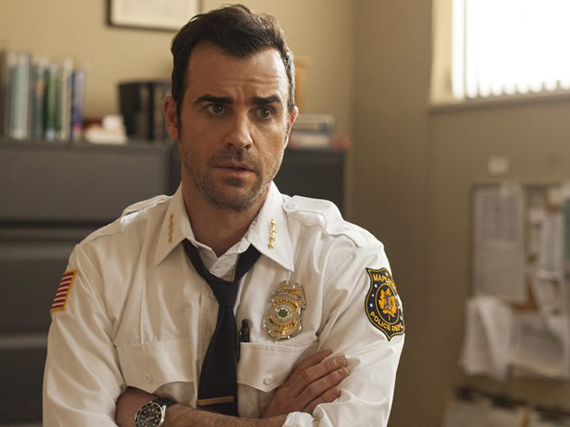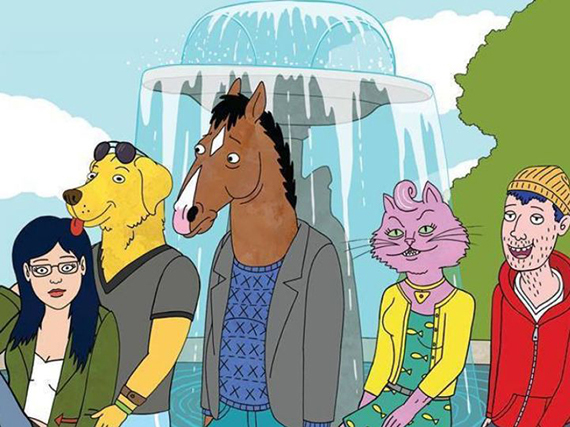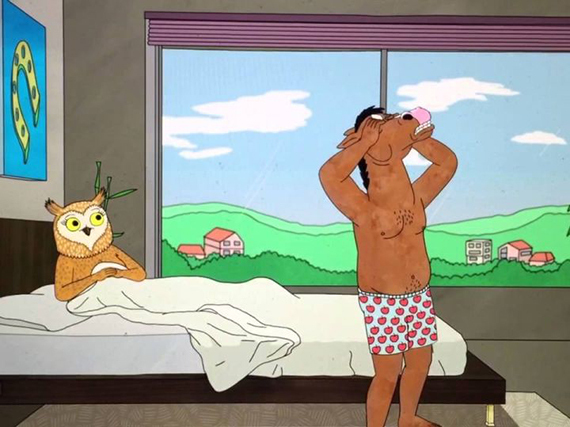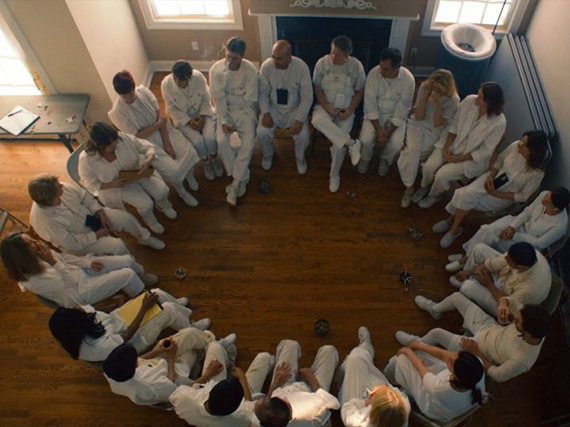By Greg Cwik
This article originally appeared on Playboy.com.
Unless you are a pop-culture masochist and find perverse joy in Manimal, the Regan-Era show whose shape-shifting premise was culled from Greco-Roman mythology and whose very brief existence was a Tragedy, you probably won't want to watch a bad TV show for very long. Why would you, in this age of unprecedentedly great TV?
It's the year 17 A.S. (anno Sopranos). Morality is ambiguous, and the quality of writing and directing is at an all-time high. Jane Campion is directing TV shows, for chrissakes. Primetime shows - those big, bold, ambitious endeavors that use marquee names to draw viewers into their searing examinations of ontological anxiety, i.e. Fargo - don't have 22 episodes to figure out their shit. They have 13, or even just 10 to convince us of their import. Even The X-Files is ditching the standards of '90s network TV: the half-dozen filler episodes every season and weekly writing-filming cycle wouldn't work today. The new season is more like a cable miniseries, giving us six hour-long episodes, each helmed by a prominent director.
We've developed unreasonably high expectations for TV; at the same time, we've come to judge shows reflexively and with stubborn certitude, thanks to our culture of quick clicks and instant feedback. The problem with this is that sometimes eh TV becomes oh-my-god-this-is-great TV. In 2015, two shows that were initially greeted with lukewarm reviews became outright masterpieces: HBO's The Leftovers and, from Netflix, BoJack Horseman. They are of the same ilk as Parks and Recreation, The Simpsons, Buffy, Angel, The Office, 30 Rock and Seinfeld - an echelon of great shows that had the opposite of a sophomore slump (hey there, True Detective / Homeland / Last Man on Earth). Call it a sophomore lunge.
The Leftovers, which Damon Lindelof and Tom Perrotta adapted from Perrotta's novel of the same name, depicts the aftermath of a Rapture-like event, called the Departure, which results in one percent of the world's population disappearing, abruptly and without any satisfying scientific or theological explanation. The point isn't that some people dissipated mysteriously; it's that everyone who was left behind, clinging to earth like so much stale cigarette smoke, has to go on living. Our main guide is Sheriff Kevin Garvey (Justin Theroux), who is just as lost as we are. Perrotta and Lindeolf imbue the show with a pervasive sense of melancholy that the book lacks, turning the wry surrealism of the novel into a devastating existentialist tragedy.
BoJack Horseman, while significantly funnier, is no less pessimistic. It's an animated show about an alcoholic horse (Will Arnett) who used to star in a Full House-like sitcom called Horsin' Around, yet it plumbs the depths of depression better, and more earnestly, than any other show this year. As with The Leftovers, the first season of BoJack was wildly uneven and didn't start to find itself until the end. It has a surprisingly low rating on Metacritic for its first season, yet it ended up on lots of Best of the Year lists months later. (Critics are generally given just a few episodes on which they base their reviews.)
The first seasons of The Leftovers and BoJack weren't exactly feel-good romps, what with the suicides and alcoholism. Delving even deeper into darkness and depression could have gone horribly awry. The Leftovers' sprawling narrative wigwagged between a huge assortment of characters in Season 1, often allotting one episode for each character, and it occasionally stumbled as it tried to tie everything and everyone together. The second season is something else entirely. The showrunners assembled a host of ace directors, including Mimi Leder and Craig Zobel. Based on original teleplays and free from the shackles of its best-selling source material, Season 2 expounds on the mysteries of Season 1 and inflates them to an almost cosmic scale (the opening credits insinuate as much, with people-shaped ciphers replacing the first season's Michelangelo-inspired art) while delving even more intimately into the lives of not only the Garveys but a new family, the Murphys.
The second season opener makes a number of ballsy moves, eschewing, for the most part, the Garveys, our emotional liaisons to this world, with no initial explanation. It opens with a 10-minute pre-historic allegory devoid of dialog. It demands that you pay attention from the first frame. It subsequently moves to a new town, leaving behind most of the inhabitants of Mapleton. The season works in mysterious ways, not meandering as much as coming to us in a carefully shuffled order. Kevin Garvey is losing his mind. The degradation of his mental health now manifests in spectral appearances of a woman (Ann Dowd) whose suicide he unwittingly abetted. Its willingness to explore mysteries without answering questions sets it apart from the year's other prestige shows. It doesn't pretend to peddle in certainty or closure; like the characters, we're trapped in vagueness and anxiety. The season reaches peak audacity with its eighth episode, channeling The Sopranos' seminal "The Test Dream," in which Tony Soprano lingers in a hallucinatory purgatory. The Leftovers doesn't explain anything (and doesn't have a title as helpful as "The Test Dream") and doesn't let us come up for air. We're trapped with Kevin in his suffocating death dream, sharing his final fleeting moments of life. We don't get to see the real world again until Kevin, defying death, claws his way through the soil in the episode's closing seconds. As the lone witness to Kevin's resurrection so eloquently says, "Holy shit."
BoJack doesn't ask unanswerable questions as much as it ponders one prevalent question: Will BoJack ever be happy? The show often unveils information in a nonlinear fashion (again, like The Leftovers), taking advantage of streaming's infinite replay abilities. The show teases recovery before giving us relapse, again and again, like an equine Tantalus. He's has been slowly committing suicide for years, and in Season 2 he finally becomes aware of the corrosive effects his self-loathing has on the people who care about him, a coterie of quickly diminishing numbers.
Like the fourth season of Arrested Development, whose ingenious architecture went painfully underappreciated in most early reviews, BoJack taps into the appeal of binge-watching, and re-watching, that's unique to streaming. The season's best episode, "Escape From L.A.," takes on an aching severity upon repeated viewings, as BoJack's actions, and the consequences of those actions, become clear. In fleeing his problems Rabbit, Run-style, BoJack has abandoned his friends, though we later find out that everyone seems to be getting along fine without him. It's only in the episode's closing moments do we realize how sad, and unsettling, the events that unfurled throughout the entire episode really are. Stripped of their innocence, the pretty moments from earlier in the episode now feel sordid, desperate. At the end, BoJack's self-loathing manifests as a psychedelic, almost stygian reiteration of the opening credits. Sitting atop his boat, drinking and smoking, cruising along the desert highway as the sun's viscera bleeds across the sky behind him, he doesn't even look like he's trying anymore.
The season finales of both The Leftovers and Bojack Horseman end not with a promise of hope, and not with a sense of hopelessness, but with the opportunity for hope -- as well as the opportunity to fail. The finale scene of BoJackimplies it's up to the characters to redeem themselves. As BoJack struggles to jog up a hill, the old man who jogs past BoJack's house every day tells him that it (jogging, living) gets easier if you keep trying, every day. The vicissitudes of fate try to stop them, but, in true existentialist fashion, people (and horses) control their own lives. It's up to Kevin to silence the voices in his head, up to BoJack to stop being a dick. And it's up to you, viewer, to give ambitious shows the time to find themselves and mature. Everyone who nearly gave up on BoJack (including yours truly) or The Leftovers almost missed out on two of the year's best shows. Now thatwould have been a tragedy.
More from Playboy.com:
Director Peter Berg on Warfare at Home and Abroad, and His Docuseries 'Live to Tell'
Also on HuffPost:




